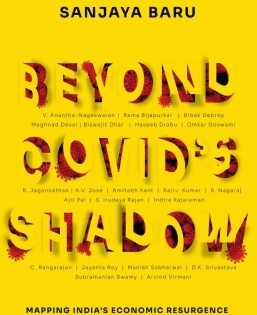'Imaginative policymaking, 12-point agenda can restore economy post pandemic' (Book Review)
By IANS | Published: January 25, 2021 12:16 PM2021-01-25T12:16:02+5:302021-01-25T12:30:17+5:30
New Delhi, Jan 25 Indias revival in a post-pandemic world is not just about getting the economic policy ...

'Imaginative policymaking, 12-point agenda can restore economy post pandemic' (Book Review)
New Delhi, Jan 25 Indias revival in a post-pandemic world is not just about getting the economic policy right, but also about getting governance and national priorities right, political commentator and policy analyst Sanjaya Baru writes in "Beyond Coronaviruss Shadow - Mapping Indias Economic Resurgence".
A compendium of 20 scholarly essays by eminent economists, academic and writers that Baru has also edited also includes a 12-point roadmap enunciated by Arvind Virmani, who has served as the government's Chief Economic Advisor and as India's Representative to the IMF
"The defining reality of the post-COVID world is uncertainty about the behaviour of consumers, savers, investors, workers and entrepreneurs. Their confidence in the future has been shaken and shaped by a new kind of uncertainty that one normally associates with an all-out global war," Baru writes in his essay titled "The Political Economy of Uncertainty".
"Never after World War II has the entire world economy been exposed to uncertainty about the response of economic agents to policy signals. The novel coronavirus is indeed a novel experience for economic policymakers. Bringing the economy back to its medium-term trajectory of growth requires imaginative policymaking and rebuilding confidence in the narrative of India's growth story. It is not just about getting the economic policy right, but also about getting governance and national priorities right," he adds.
The book, published by Rupa, has been divided into six parts: Managing Growth And Uncertainty, The Fiscal Dimension, Pandemic And The People, Trade Policy, Employment and Migration, and New Economy.
Setting the tone for the discourse, Baru notes in the Introduction that economic policymaking "is, at the best of times, an exercise based on a variety of assumptions about human response to economic incentives and disincentives. Much theorizing and policy formulation have been based on the classic assumption of ceteris paribus
( With inputs from IANS )
Disclaimer: This post has been auto-published from an agency feed without any modifications to the text and has not been reviewed by an editor
Open in app